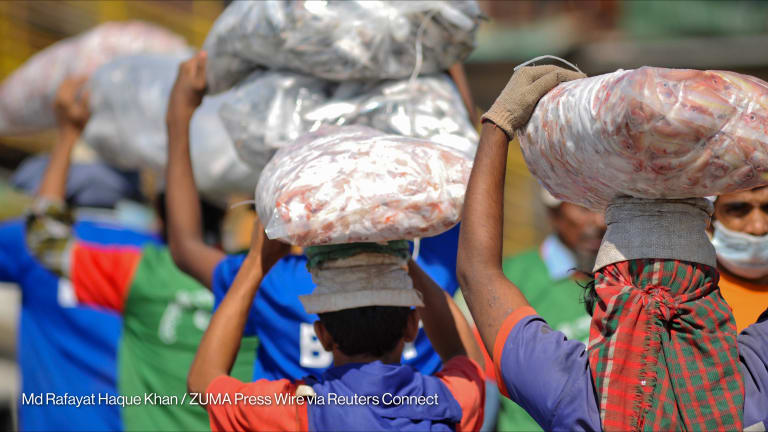GE: Human capital is the foundation for Myanmar's growth
The Myanmar economy continues to heat up as investors look to take advantage of the country's more open market policies. But many companies remain on the sidelines due to the difficulty of doing business in the country. Devex caught up with Andrew M. Lee, GE's chief country representative in Myanmar, who explained the trade-offs of investing in today's Myanmar.
The Myanmar economy continues to heat up as investors look to take advantage of the country’s more open market policies. A new foreign investment law and corresponding rules have provided a formal framework to govern and stimulate foreign investment, established business incentives, and increased investor confidence across a variety of sectors. Some estimates peg foreign direct investment in Myanmar at over $8 billion for the 2014-2015 financial year, which is more than 25 times what the country received in 2009-2010. For the next fiscal year, the country is targeting economic growth of 9.3 percent, which can only be accomplished if businesses continue to invest and expand. Still, despite the country’s economic growth, many companies remain on the sidelines. Myanmar ranks 177th out of 189 countries in the World Bank Doing Business 2015 report, scoring poorly on most measures, including starting a business, protecting minority investors and enforcing contracts. Investors big and small cite major operational issues, such as business registration, banking and other administrative hurdles, real estate costs, labor laws and visa requirements, and talent acquisition as reasons for staying away, at least for the time being. To better understand the risk and reward trade-offs of investing in today’s Myanmar and the importance of social investment in the country, Devex caught up with General Electric’s Andrew M. Lee, who serves as the American company’s chief country representative in Myanmar. An emerging markets veteran who has worked for several major multinationals, Andrew is unabashedly passionate about the positive role a company like GE can play in Myanmar’s development. And under his leadership in this frontier market, GE is experiencing early success from some innovative professional and social development programs. How would you describe the current private sector investment climate in Myanmar? Myanmar is more attractive to foreign investors than it used to be a few years ago. Rules and regulations have been amended to accommodate investors to enforce more secured contracts, and reduce concerns when it comes to property rights and settling disputes. The banking system has also been improved allowing businesses and the general public to regain their trust in the system. Nine foreign banks have been granted licenses to operate in the country, which would allow better flow of investments from outside Myanmar as well as improve banking practices within the country. What are some of the risks that jeopardize the country’s socio-economic growth? Myanmar is developing quickly, but just like any other country, things don’t change overnight. One top constraint is bank borrowing where, according to the World Bank, only 1 percent of fixed asset investment costs are financed by bank borrowing, while 92 percent rely on their own funds. Almost nonexistent bank borrowing can curtail the growth of small and medium enterprises, and thwart entrepreneurs’ ability to flourish. Another risk to growth is Myanmar’s current low electrification rates, one of the lowest in the world. Access to reliable, stable and efficient power is still a major problem. Electricity is a prerequisite for economic growth. GE is committed to playing a role in improving the current situation by joining Myanmar Electric Power Enterprises in repowering and upgrading two existing gas turbines in Yangon. The initiative will result in approximately 25 megawatts of additional power using the same amount of gas. Why is local capacity building so important for GE’s future growth in the country? Human capital is the basic foundation for any country trying to develop and grow its economy. Foreign investors need a young workforce that is able to communicate in English, and who can be trained. Given that Myanmar only recently re-engaged with the international community, there is a dearth of skilled labor and managerial staff, leading to high competition for talented employees. What training programs has GE pursued to build a strong workforce in Myanmar? GE is working closely with business and management leaders from both public and private sectors. GE provided leadership training at the Crotonville Global Learning Center for 27 leaders, including delegates from Myanmar’s Ministry of Electric Power, Ministry of Energy, Ministry of Health and Ministry of Transportation. The intensive training program focused on the development of leadership skills integral to advancing business, compliance and regulatory practices as well as business and technology overviews covering the aviation, health care, and oil and gas industries, as well as GE’s leadership philosophy, talent management strategies, rule of law and compliance best practices. In addition, 60 leaders from public and private sectors attended the GE-sponsored program at the Lee Kuan Yew School of Public Policy in Singapore and “train the trainers” in Naypyitaw, which provided participants with lessons on infrastructure development, competition policy, transparency and procurement practices. Can you describe the current state of Myanmar’s health systems and infrastructure? Strengthening health care systems is critical for Myanmar’s economic growth. According to the World Bank, health care spending used to be one of the lowest in the world. The rapid political changes have contributed to a more liberalized health care system. The government has pledged to quadruple health care spending, which has opened up new opportunities for more FDIs in the health care sector. The GE Foundation announced in June 2013 that it would expand its Developing Health Globally program to include Myanmar. The initial work focused on decreasing the rate of maternal and newborn infection at government-operated, district-level hospitals and clinics, as well as strengthening other aspects of maternal care. GE partnered with the Ministry of Health in Myanmar and Jhpiego, an affiliate of Johns Hopkins University, to fulfill this commitment. GE delivered and completed the installation of medical equipment at major hospitals in Yangon. This is part of GE Foundation’s $7 million commitment to Myanmar to strengthen its health care system, improve its energy architecture and promote the development of Myanmar’s human capacity. On a personal level, what has it been like for you to return to Myanmar as the leader of a major American company? I returned to Myanmar with sincere intentions to help develop my country and to improve the capability of our current and future generations. A country representative needs to understand the customs and culture in order to successfully execute any business and continue to strengthen both private and public relationship engagements. I understand both, and I am proud to be the chief country representative of GE Myanmar solving some of the country’s toughest challenges. These are exciting times for someone like me to be part of GE in Myanmar. Check out more insights and analysis for global development leaders like you, and sign up as an Executive Member to receive the information you need for your organization to thrive.
The Myanmar economy continues to heat up as investors look to take advantage of the country’s more open market policies. A new foreign investment law and corresponding rules have provided a formal framework to govern and stimulate foreign investment, established business incentives, and increased investor confidence across a variety of sectors.
Some estimates peg foreign direct investment in Myanmar at over $8 billion for the 2014-2015 financial year, which is more than 25 times what the country received in 2009-2010. For the next fiscal year, the country is targeting economic growth of 9.3 percent, which can only be accomplished if businesses continue to invest and expand.
Still, despite the country’s economic growth, many companies remain on the sidelines. Myanmar ranks 177th out of 189 countries in the World Bank Doing Business 2015 report, scoring poorly on most measures, including starting a business, protecting minority investors and enforcing contracts. Investors big and small cite major operational issues, such as business registration, banking and other administrative hurdles, real estate costs, labor laws and visa requirements, and talent acquisition as reasons for staying away, at least for the time being.
This story is forDevex Promembers
Unlock this story now with a 15-day free trial of Devex Pro.
With a Devex Pro subscription you'll get access to deeper analysis and exclusive insights from our reporters and analysts.
Start my free trialRequest a group subscription Printing articles to share with others is a breach of our terms and conditions and copyright policy. Please use the sharing options on the left side of the article. Devex Pro members may share up to 10 articles per month using the Pro share tool ( ).
Former director of global advisory and analysis, Pete managed all Devex research and analysis operations worldwide and monitors key trends in the global development business. Prior to joining Devex, Pete was a political and security risk consultant with a focus on Southeast Asia. He has also advised the U.S. government on foreign policy and led projects for the Asian Development Bank and International Finance Corp. He still consults for Devex on a project basis.








